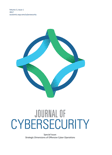
Journal of Cybersecurity
Scope & Guideline
Empowering research to tackle tomorrow's cybersecurity challenges.
Introduction
Aims and Scopes
- Human-Centric Cybersecurity:
Research focusing on the human factors in cybersecurity, including behaviors, attitudes, and decision-making processes related to security practices. - Technical Innovations and Tools:
Development and analysis of new tools, frameworks, and technologies aimed at enhancing cybersecurity measures, including malware detection and risk assessment. - Policy and Regulatory Analysis:
Examination of the implications of cybersecurity policies, regulations, and frameworks, such as GDPR, and their effectiveness in protecting data and privacy. - Cyber Threat Intelligence:
Studies on the sharing and utilization of threat intelligence among organizations to improve collective cybersecurity defenses. - Cybercrime and Incident Analysis:
Investigative research into the nature, impact, and mitigation strategies of cybercrime incidents, including ransomware and data breaches. - Interdisciplinary Approaches to Cybersecurity:
Integration of insights from various disciplines such as economics, sociology, and political science to understand and address cybersecurity challenges.
Trending and Emerging
- Human Factors in Cybersecurity:
An increasing focus on understanding how human behavior impacts cybersecurity practices, including the psychological aspects of phishing and ransomware experiences. - Cybersecurity in Emerging Technologies:
Growing interest in the cybersecurity implications of new technologies, such as IoT, 5G, and quantum computing, as well as the associated risks and mitigation strategies. - Cybersecurity Policy and Governance:
An uptick in research addressing the governance of cybersecurity, including data protection laws and the role of international norms in shaping cyber policies. - Collaborative Cyber Defense Strategies:
Emerging themes around the importance of collaboration among organizations and sectors to enhance collective cybersecurity efforts and intelligence sharing. - Economic Models of Cybersecurity:
Increasing exploration of economic frameworks related to cybersecurity investments, including bug bounty programs and the cost-benefit analysis of cybersecurity measures.
Declining or Waning
- Basic Cybersecurity Awareness Programs:
While foundational awareness programs were once a focal point, recent publications suggest a shift towards more advanced and tailored approaches to cybersecurity education. - Traditional Cybersecurity Risk Assessment Models:
There is a noticeable decline in papers discussing conventional risk assessment frameworks, possibly due to the emergence of more dynamic and adaptive methodologies. - Generalized Cybersecurity Metrics:
Research focusing on broad and generalized metrics for assessing cybersecurity effectiveness seems to be decreasing, as more specific and context-driven metrics gain traction.
Similar Journals
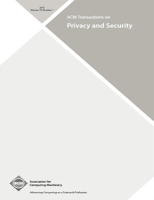
ACM Transactions on Privacy and Security
Advancing Knowledge in Privacy and Risk Management.ACM Transactions on Privacy and Security, published by the Association for Computing Machinery, is a prestigious journal dedicated to the field of computer science, with a particular focus on privacy and security in modern computing environments. Since its inception in 2016, this journal has become a vital resource for researchers, professionals, and students alike, addressing the increasing concerns surrounding data protection and risk management. With an impressive impact factor and recognition as a Q1 journal in both Computer Science (Miscellaneous) and Safety, Risk, Reliability and Quality, it ranks among the top publications in its field, positioned at the 73rd percentile in General Computer Science and the 71st percentile in Engineering. The journal’s Open Access options enhance accessibility to cutting-edge research, fostering collaboration and innovation in the rapidly evolving landscape of privacy and security. Readers can expect high-quality peer-reviewed articles that contribute significantly to both theoretical and practical advancements in technology and data security.

Revista de Ciencias Humanas da Universidade de Taubate
Championing Open Access for Global Scholarly ExchangeRevista de Ciências Humanas da Universidade de Taubate is a prominent academic journal dedicated to advancing knowledge in the field of Human Sciences, published by the esteemed Universidade de Taubate in Brazil. With an ISSN of 2179-1120, this journal plays a crucial role in disseminating scholarly research and fostering intellectual discourse among researchers, professionals, and students alike. Although currently not indexed in major databases, its commitment to open access ensures that vital insights and findings are readily available to a global audience. The journal encompasses a wide scope of topics within Human Sciences, including psychology, sociology, and education, making it an invaluable resource for those seeking to understand human behavior and societal dynamics. As the academic landscape continues to evolve, the Revista de Ciências Humanas remains a key player in promoting innovation and collaboration within the academic community.

Information
Cultivating a community of information pioneers.Information is a distinguished open-access journal published by MDPI since 2010, dedicated to advancing the field of Information Systems. With its E-ISSN 2078-2489, the journal serves as a crucial platform for researchers, professionals, and students to disseminate and access innovative research and methodologies in the domain of information science, data management, and technology. Based in Basel, Switzerland, the journal has established a commendable reputation in the academic community, currently holding a Q2 ranking in the prestigious Scopus category of Information Systems, and occupies the 74th percentile among its peers. The breadth of the journal's objectives is to promote and facilitate the open exchange of ideas, research findings, and emerging trends, fostering collaboration and knowledge growth in a rapidly evolving digital landscape. With an unwavering commitment to high-quality scholarship and accessible knowledge, Information plays an essential role in shaping the future of the information sciences.

Frontiers in Computer Science
Fostering collaboration for groundbreaking advancements in technology.Frontiers in Computer Science is a premier open-access journal published by Frontiers Media SA that has rapidly established itself as a prominent platform for scholarly research in the diverse and evolving field of computer science. With a notable impact factor reflecting its high citation rates, this journal aims to disseminate innovative findings and groundbreaking studies across multiple subdisciplines, including Computer Science Applications, Computer Vision and Pattern Recognition, and Human-Computer Interaction. Since its inception in 2019, and with a consistent trajectory from 2019 to 2024, it has garnered accolades, achieving Q2 ranking in several categories and an impressive Q1 in miscellaneous areas of computer science. Researchers, professionals, and students alike are encouraged to contribute to this dynamic journal that serves as a vital resource for advancing knowledge and fostering collaborative dialogue in the global computer science community. Frontiers in Computer Science is committed to providing open access to research, promoting unrestricted sharing of ideas and fostering innovation at the intersection of technology and society.

Computer Science Journal of Moldova
Exploring New Frontiers in Computational ExcellenceComputer Science Journal of Moldova, published by the Institute of Mathematics and Computer Science Academy, serves as a pivotal platform for disseminating research in the field of computer science since its inception in 1993. With a focus on a diverse range of subjects, including Artificial Intelligence, Computational Mathematics, and Software Engineering, this open access journal aims to foster innovation and collaboration among researchers, students, and industry professionals. Despite its current positioning in the lower quartiles as per the latest Scopus rankings, the journal remains committed to enhancing the visibility of regional research and addressing contemporary challenges through scholarly contributions. The journal’s open access model ensures that knowledge is freely available, promoting broader readership and impact within the international academic community. As it moves through the converged years from 2019 to 2024, the Computer Science Journal of Moldova continues to aspire toward empowering the next generation of computer scientists while enriching the global dialogue in this rapidly evolving field.
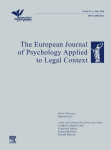
European Journal of Psychology Applied to Legal Context
Shaping Policy with Psychological Expertise in Legal MattersThe European Journal of Psychology Applied to Legal Context, published by the COLEGIO OFICIAL PSICOLOGOS MADRID, is a premier open-access journal that has been contributing to the interdisciplinary fields of psychology and law since its inception in 2009. With an E-ISSN of 1989-4007, the journal has established itself as a leading outlet for innovative research, boasting impressive Scopus rankings—3rd in Social Sciences (Law) and 9th in Psychology (Applied Psychology), both within the prestigious Q1 quartile category for 2023. This significant impact reflects the journal's commitment to advancing scholarly understanding and application of psychological principles in legal contexts, making it an essential resource for researchers, professionals, and students. Distributed globally, the journal offers unrestricted access to its articles since 2013, aligning with the shared goal of enhancing knowledge and fostering collaboration among diverse academic and professional communities. By bridging the gap between psychological research and legal practice, the European Journal of Psychology Applied to Legal Context plays a crucial role in shaping policy, guiding best practices, and informing education in both fields.
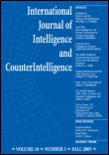
International Journal of Intelligence and Counterintelligence
Advancing knowledge in the realms of espionage and policy analysis.The International Journal of Intelligence and Counterintelligence, published by Routledge Journals, Taylor & Francis Ltd, stands at the forefront of scholarly discourse in the fields of intelligence studies and counterintelligence. With its ISSN 0885-0607 and E-ISSN 1521-0561, this journal has been a crucial platform for interdisciplinary research since its inception in 1986, engaging scholars from political science and international relations. Currently categorized as Q3 in Political Science and International Relations, it ranks in the 45th percentile according to Scopus metrics, highlighting its growing influence and relevance within the academic community. While not an Open Access journal, it offers subscription and institutional access options, ensuring that professionals, investigators, and students have robust access to its critical findings and discussions. The journal aims to illuminate both theoretical perspectives and practical implementations regarding national security, espionage, and policy analysis, making it an essential resource for those looking to navigate the complexities of intelligence frameworks in increasingly volatile global contexts.

Jordanian Journal of Computers and Information Technology
Advancing Research and Collaboration in Emerging TechnologiesJordanian Journal of Computers and Information Technology, published by Princess Sumaya University and SRSF, stands as a significant platform for scholarly research in the realm of computer science, particularly in topics related to emerging technologies and information systems. With its Open Access model initiated in 2015, the journal facilitates global access to high-quality research findings, embodying the principles of knowledge sharing and academic collaboration. The journal's ranking in the Q3 category of Computer Science (miscellaneous) and its placement in the 54th percentile of Scopus' General Computer Science rankings underscore its growing reputation among researchers and professionals alike. Situated in Amman, Jordan, the journal actively contributes to the regional and international discourse on computing methodologies, applications, and innovations, making it an indispensable resource for scholars seeking to advance their understanding and engage with contemporary issues in technology.

International Journal of Cyber Criminology
Connecting scholars to combat cyber threats effectively.International Journal of Cyber Criminology is a premier open-access journal dedicated to advancing the field of cyber criminology, publishing cutting-edge research that addresses the intricate relationship between technology and crime. Established in 2007 and published under the esteemed guidance of K Jaishankar, this journal serves as a fundamental resource for researchers, professionals, and students engaged in the study of cybercrime, online security, and digital justice. With an impressive ranking in the Q2 quartile in Law and a notable 81st percentile in Scopus Ranks, it reflects its commitment to high-quality scholarship and impact within the academic community. The journal aims to foster interdisciplinary dialogue and innovative solutions to contemporary cybercrime challenges while supporting free access to knowledge. Hailing from Manonmaniam Sundaranar University in Tamil Nadu, India, the International Journal of Cyber Criminology exemplifies a global perspective on issues affecting society in the digital age, making it an essential publication for those seeking to understand and combat cyber threats.
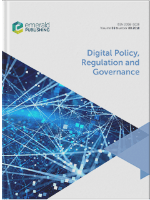
Digital Policy Regulation and Governance
Navigating the Future of Digital GovernanceDigital Policy Regulation and Governance, published by Emerald Group Publishing Ltd, is a leading academic journal dedicated to the fast-evolving fields of digital policy, regulatory frameworks, and governance practices in the digital age. With an ISSN of 2398-5038 and E-ISSN 2398-5046, this journal has been instrumental since its inception in 2017, paving the way for critical discussions surrounding the intersection of technology, policy, and societal governance, particularly in the context of rapid digital transformation. The journal is recognized in the Q2 category across several disciplines, including Computer Networks and Communications, Information Systems, and Management Information Systems, reflecting its relevance and quality within the academic community. With notable Scopus rankings placing it among the top tiers in multiple areas, Digital Policy Regulation and Governance serves as an essential resource for researchers, professionals, and students looking to navigate and shape the future of digital governance. While it currently does not offer open access options, its commitment to enriching the academic dialogue on digital policies and regulation remains steadfast, stimulating innovation and thought leadership in this critical field.